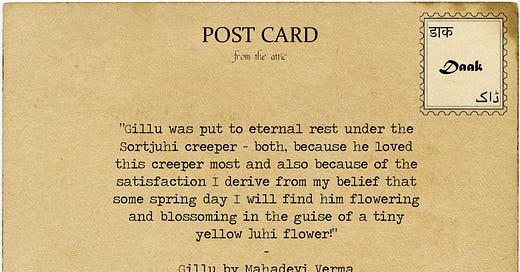The isolation of the pandemic led many of us to find comfort and companionship in animals. Their playfulness and unsolicited devotion soothed our anxiety and gave a semblance of normalcy to a world that seemed to be spiraling out of control. Mahadevi Verma’s short story, “Gillu”, although far removed from us in time and context, echoes this sentiment. Although widely celebrated for her writing and activism, Verma’s love for birds and animals — many of whom she found injured and fostered —goes unmentioned, as is often the case with our quietest strengths.
“Gillu” is a simple story of such a discovery and begins with Verma who, seeing a golden jasmine bud, is reminded of an injured squirrel that she once rescued. Seeing Gillu’s condition, everyone predicts that he will not survive but Verma diligently cleans his wounds and nurses him back to health. Gillu makes a quick recovery, surprising everyone with his “smooth fur, bushy tail and naughty, refulgent eyes” as well as his “antics and intellect”. Verma narrates some of these in delightful detail:
“When I would sit down to write, he would be seized by such an acute desire to attract my attention that he devised a novel way of doing it. He would venture close to my feet, whiz swiftly up the curtains and descend with the same breakneck speed. On some occasions, I used to hold Gillu and put his tiny body in a long envelope, that would— except for his head and claws—crease his entire body Sometimes, he would continue to stand on the table, leaning against the wall— in such an amazing condition— for hours, and watch my activities with his radiant eyes.”
If Gillu is observant of Verma’s varying moods, she also pays close attention to his needs. Upon the arrival of spring, she notices him conversing with other squirrels near the window. She decides to set him free by creating a small opening for him in the wire-meshed window in her study. With this, both fall into a daily rhythm: Gillu leaves when Verma leaves for work, and comes back promptly when she returns. When she has an accident and is confined to her bed, Gillu, with an instinctive sensitivity that only animals possess, abandons all his activities to stay by her side.
“During the course of my indisposition, he would sit near my head on my pillow and gently stroke my forehead and hair, and his moving away was like the going away of a nurse or attendant! When I used to work during summer afternoons, Gillu would abstain from going outside or sitting in his swing. To keep himself close to me and also to tackle the summer heat, he had discovered a totally new method. He would lie prostrate on the surahi (earthen pot) kept near me and thus remain both close to me as well as be cool!”
However, this pure and intimate friendship is short-lived as Gillu passes away after two years. As Verma reckons with this loss, she looks for his spirit in other gifts of nature, reminding us to look beyond our worldly preoccupations.
“Gillu was put to eternal rest under the Sortjuhi creeper - both, because he loved this creeper most and also because of the satisfaction I derive from my belief that some spring day I will find him flowering and blossoming in the guise of a tiny yellow juhi flower!”
Translation by Prem K Srivastava




this absolutely made my day!! so beautiful